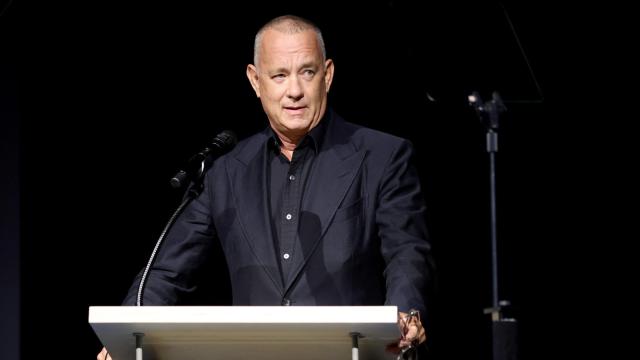Academy Award winner Tom Hanks has taken millions of viewers on fictional journeys to space through his performances in Apollo 13, and Cloud Atlas, but when offered a chance to experience the real thing on a Blue Origin rocket, the 65-year-old actor said he’d pass.
The comments came during a recent appearance on Jimmy Kimmel Live where the host asked Hanks if Blue Origin founder Jeff Bezos had asked him to fill a seat on the company’s New Shepard rocket.
“Well yes, provided I pay!” Hanks said, before going on to complain about the flight’s expensive price tag. “I’m doing good Jimmy, I’m doing good, but I ain’t paying 28 million bucks.”
Here, Hanks was likely referring to the $US28 (A$38) million auction held earlier for a seat aboard Blue Origins’s first crewed flight. Blue Origin did not immediately respond to Gizmodo’s request for comment asking about the going price for future Blue Origin seats.
Hanks went on to “simulate” the experience of going to space. The actor leaned back in his chair, opened his eyes to gaze intently at the ceiling, and commenced to shake uncontrollably like a fish flopping out water, uttering out occasional bursts of guttural belches.
“You do that for four minutes and then you’re floating.”
The embarrassing comments are bad news for Blue Origin, which has made high-profile, nostalgia-inducing celebrities a key focus of its public image. During the company’s first crewed flight, Jeff Bezos and his brother famously launched alongside former female aviator and astronaut hopeful Wally Funk. The 82-year-old woman has said she was overlooked as an astronaut because she’s a woman.
Then, just last month Captain Kirk (William Shatner) himself became the oldest man to travel beyond the Kármán line aboard Blue Origin’s second crewed flight. Shatner’s “extraordinary” trip — which left him in tears — was above all else an excellent marketing move for Blue Origin. However, not everyone was impressed, most notably Shatner’s Star Trek Costar George Takei.
“He’s boldly going where other people have gone before,” Takei told The New York Post’s Page Six. “90 years old is going to show a great deal more on the wear and tear on the human body, so he’ll be a good specimen to study,” Takei added. “Although he’s not the fittest specimen of 90 years old.”
Hanks’ comments also come amid a series of more serious problems brewing at Blue Origin.
A recent essay signed by 21 current and former Blue Origin employees accused the company of being “rife with sexism,” alleging numerous senior leaders had acted inappropriately towards women.
Then, just this week, the company officially lost its tedious months-long lawsuit attempting to challenge NASA over its decision to award SpaceX a $US2.9 (A$4) billion lunar lander rover contract. In a statement to Gizmodo following the ruling, a Blue Origin spokesman said the company “remains deeply committed to the success of the Artemis program, and we have a broad base of activity on multiple contracts with NASA to achieve the United States’ goal to return to the Moon to stay.”
Though the space tourism industry is still nascent, these blunders and PR mishaps risk ceding even more ground to competitor SpaceX, which has already demonstrated it can keep passengers in orbit for multiple days. For a clearer sense of what’s at stake, a 2019 report from investment firm UBS viewed by CNBC predicted the global space tourism market could be worth $US3 (A$4.06) billion by 2030. That’s significant, but a fraction of the whopping $$US805 (A$1,088) billion evaluation expected for the rest of the space industry by the same year.
